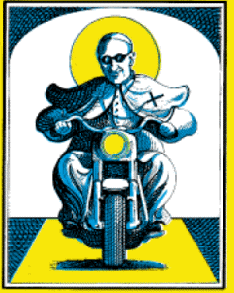Pope Francis, may he never stop speaking off the cuff, has caught a fair amount of flak for making remarks in his latest in-flight press conference that suggested that Charlie Hebdo bears some responsibility for the terrorist attack against it. Attention has focused on these sentences:
But if Dr. Gasbarri (the papal trip organizer who was standing beside him), a great friend, says a bad word against my mother, then a punch awaits him. But it’s normal, it’s normal. One cannot provoke, one cannot insult other people’s faith, one cannot make fun of faith.
A case can be made, however, that Francis was not throwing free speech “under the popemobile,” as my RNS colleague Brian Pellot contends. After condemning violence in the name of religion in no uncertain terms, His Holiness goes on to say the following, immediately prior to the above:
As for freedom of expression: each one not only has the freedom, the right but also the obligation to say what one thinks to help the common good. The obligation! Let’s think, if a member of parliament or a senator doesn’t say what he thinks is the right path then he does not collaborate for the common good. Not only these, but many others too. We have the obligation to say openly, to have this liberty, but without giving offense, because it is true, one cannot react violently.
So Francis is emphasizing the importance of free speech — indeed making it obligatory — but also saying that in speaking freely, one should avoid giving offense because doing so can provoke an impermissible violent reaction. This amounts to the American legal doctrine of “fighting words” — speech unprotected by the First Amendment because it is likely to make the person to whom it is addressed act violently.
The controlling case, Chaplinsky v. New Hampshire (1942), involved a Jehovah’s Witness who created a public disturbance by calling all religion a “racket” as he distributed his literature on the street. When he was taken away by local law enforcement, he called the officials and town government fascists. In the midst of the war against fascism, the Supreme Court found that this was not protected speech.
No doubt, the pope could have expressed himself better. But it’s worth bearing in mind that just because one’s fighting words are not entitled to the highest legal protection does not mean that violent reaction to them is justified. I’d be willing to bet that His Holiness is no foe of laws against hate speech. But that doesn’t make him an enemy of free expression.






